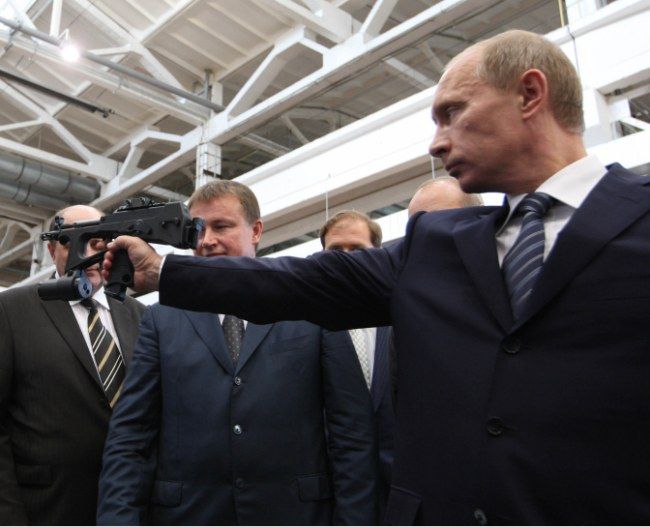Many in Russia and the West have come to believe, under the influence of Putin and pro-Putin propaganda that Russia’s intelligence services are all-powerful and invariably successful agents of the Kremlin, Kseniya Kirillova says. But that image is far from true and recognizing that is the first requirement for countering what they are doing.
In a new article, the US-based Russian journalist says that all too many people in the West believe that “the Russian special services operate at the very highest professional level and in principle are invincible.” But besides their “’victories,’” they have suffered “a number of foreign policy failures.”
The apparent success of the Russian special services in “playing on the real and imagined contradictions of American society” and thereby promoting the victory of Donald Trump in last year’s US presidential elections -- a success that exceeded the Kremlin’s expectations -- has created this impression, but a closer examination shows it is not justified, Kirillova says.
Such an examination, she continues, shows that “the situation is not as critical as it might appear at first glance” because “alongside Moscow’s ‘victories’ in recent years one observe s a number of major foreign policy failures,” including the collapse of Putin’s plans for creating “Novorossiya” in Ukraine and the scandal around his failed coup attempt in Montenegro.
“One of the main weaknesses of the Russian special services,” Kirillova suggests, “is the absence of a long-term and precise strategy regarding each particular country” where they operate. Instead, again and again, these services operate according to “one and the same scenario” even if local conditions would appear to suggest otherwise.
That scenario has both strengths and weaknesses. Among its chief features are:
- Recruitment of Western politicians by appealing to their interests, buying them off or using compromising information against them;
- Playing on the divisions that exist in all countries and pushing the view that these are all critical and cannot be resolved;
- Active measures like propaganda and hacker attacks based on the use of “’useful idiots’” in these countries;
- Relying on criminals if its destabilization efforts enter “’a hot phase;’”
- And active use of religious propaganda.
Kirillova notes that the religious propaganda of the Russian special forces is better described as “propaganda of an ideology under the form of religion,” which carries the message that Russia is “the main defender” of religious values, something that allows it to penetrate and then piggy back on other religious groups.
As a result, Kirillova says, “Russia has experienced failure” in this area more than Western intelligence agencies.
In recent years, the Russian intelligence services have applied this model to the US; but their successes if successes they be “has depended not so uch on the professionalism of the Russians as on the coming together of a multitude of fatal factors which undoubtedly have played into the hands of the Kremlin.
Among these, Kirillova says, are “the real economic problems” of rural America, “radical” Republican propaganda demonizing its opponents in ways that resemble what Russian propaganda does, the Democratic Party’s failure to counter this or to seek to represent the interests of many Americans, and the critical attitude of most Americans to the government and mainstream media.
These are all things the Russian special services exploited, she continues, but “not one of these factors was created thanks to the ‘KGB.’ The Russian special services only made use of all of the factors listed on behalf of their own interests.”
First of all, for all their skill in destabilizing things and spreading lies, the Russian special services are “traditionally weak in their ability to assess the total picture, concerning the mentality of the people and its role in what is going on. That was clearly on view in the case of Putin’s intervention in Ukraine, when he expected a totally different reaction than he got.
Because the Russian leadership doesn’t view nations as acting except under the direction of leaders, the Kremlin on many issues has remained “a prisoner of its own illusory reality” and pursues policies that inevitably fail as in the case of many of its immediate neighbors, the former Soviet republics and formerly occupied Baltic countries.
Moreover, Kirillova says, “Russia acts too clumsily and, in contrast to Soviet times, now its interference in the affairs of other countries is visible even to the unaided eye.” Moscow’s support for Trump, for example, was so obvious, that “no one of those wanting to have an objective view of the situation could fail not to notice.”
The situation of Moscow’s failed effort to promote a coup in Montenegro was even more obvious, but it has attracted less attention not only because Montenegro is a smaller country than the US but because Moscow failed and has not trumpeted its failure for all to hear.
In addition and “unfortunately,” Kirillova argues, “the unmasking of the aggressive interference by Moscow in the affairs of other states has not yet brought any practical value because the West, as a result of its weakness and divisions, is not capable of responding to even such obvious aggression.” If the West changes, the failures of the Russian services will be even more obvious.
“All these factors,” Kirillova concludes, “allow one to hope that in the future, the ‘KGB’ will lose just as it lost the First Cold War. The main problem remains only that until the moment of that defeat, Russian can inflict and is already inflicting irreparable harm” given that there is no possibility of restoring the lives it has taken or ruined already.
Related:
- Like Crimea, 'Trump is Ours,' Russian products proclaim and other neglected Russian stories
- Religious affairs in Russia now under control of security services
- Moscow spy services said deploying Russian criminal world against Ukraine
- FSB defector's claims about Moscow's ties to ISIS consistent with other evidence, Kirillova says
- Putin using all means against the West -- including Islamist terrorism -- Piontkovsky says
- Putin wants to do more than to install Trump as US president: he wants to destroy the West
- Serbian nationalists on Moscow's service






